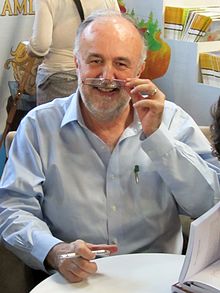Marco Antonio de la Parra | |
|---|---|
 At FILSA 2016 | |
| Born | 23 January 1952 Santiago, Chile |
| Other names | Zap Zap |
| Alma mater | University of Chile |
| Occupation(s) | Psychiatrist, writer, dramatist |
| Spouse | Ana Josefa Silva |
Marco Antonio de la Parra (born 23 January 1952) is a Chilean psychiatrist, writer, and dramatist. Many of his works, which are strongly influenced by the country's 1973–90 military regime, satirize the national condition through metaphors. He is the author of more than 70 titles translated into several languages, including plays, novels, storybooks, and essays.
Marco Antonio de la Parra studied at the National Institute and later enrolled at the University of Chile, where he graduated as a surgeon in 1976 and specialized in adult psychiatry.
His career as a dramatist began at the university, where he directed the Theater of the Faculty of Medicine from 1974 to 1976, and became known as a playwright. In 1975 he received an honorable mention in the university's dramaturgy competition for Matatangos, disparen sobre el zorzal, which would be released three years later.[1]
In 1978, his play Lo crudo, lo cocido, lo podrido was censored prior to its premiere at the Catholic University. Hernán Larraín, the head of a commission representing the military regime, insisted that this was not a political persecution, writing, "We suppress it for the language and its content, which we consider disrespectful." María de la Luz Hurtado, a researcher for the university's theater school, disagreed with this, writing, "The work was not censored because there was rudeness, but for a political issue, obviously. There is no doubt that what is symbolized there is the authoritarian order."[2]
Between 1984 and 1987, de la Parra directed the company La Teatroneta. He then founded the Theater of the Inextinguishable Passion. He was later artistic director of the Transatlantic Project, for scenic investigation and expanding the exchange of theatrical teaching between Chile and Spain.[3] As an actor, he has interpreted many of his own works.
With Chile's return to democracy, after Augusto Pinochet was forced to surrender power due to his defeat in the 1988 plebiscite, de la Parra was appointed cultural attaché to the embassy in Spain by the government of Patricio Aylwin. He served in this position from January 1991 to September 1993.
On his return from Spain, he was a television critic for the evening edition of La Segunda, under the pseudonym Zap Zap, until 1998. De la Parra has ventured into several literary genres: story, novel, drama, essay, script, and chronicle. In addition, he has taught at the Catholic University, where he was Professor of Dramaturgy from 1993 to 1995. Beginning in 2005, he directed Finis Terrae University's School of Literature of the Faculty of Communications and Humanities and, from 2012 to 2015, its Theater School.[4] At this house of studies he also directs the 21st Century Chair, which puts forward reflections on the great trends that are prevailing in the fields of culture, science, and social disciplines.[5] He was the host of Puro cuento on Duna FM. In addition, he conducts dramaturgy workshops both in Chile and abroad.
As of 2014, he has a column in La Segunda.[6]
In 1997 he was elected an active member of the Chilean Academy of Fine Arts, where he occupies chair No. 22.[7] His works have been translated into several languages.
He is married to the journalist Ana Josefa Silva.

Professor Adolfo Albornoz Farías argues that,
From the thematic perspective, the theatrical production of Marco Antonio de la Parra is organized around three substantial investigations. The first is related to the permanent revision of Chilean history and identity, especially in its republican and modern context. The national imagination, its stories and myths, referents and icons, and its memory, have been preferentially examined in Lo crudo, lo cocido, lo podrido (1978), through La pequeña historia de Chile (1994). The second research project is related to the incessant siege of the subjectivity of the Chilean middle class at the end of the 20th century and the beginning of the 21st century. The main tensions of this class, their loves and hatreds, loyalties and betrayals, its political and economic determinants, have been particularly addressed, for example, in Infieles (1988), El continente negro (1994), Monogamia (2000), and Sushi (2003). The third obsession has been the permanent appropriation and resemantization, since the end of the century in Chile, of many of the main western cultural icons. Marx and Freud, Tarzan and Mandrake, Neruda and Dostoevsky, Shakespeare and Cervantes, Pinochet and Bush, Greek tragedy and reality shows, high tech and sushi, war and the mass media, etc., have been collected and reworked from Matatangos, disparen sobre el zorzal (1975), through La secreta obscenidad de cada día (1984), King Kong Palace o el exilio de Tarzán (1990), and Madrid/Sarajevo (1999), to Wittgenstein, el último filósofo (2004), among many other pieces.[1]
